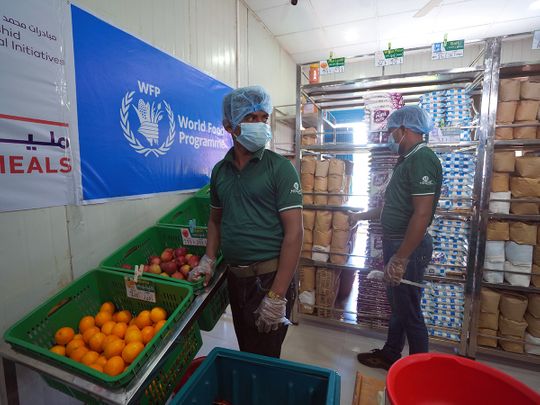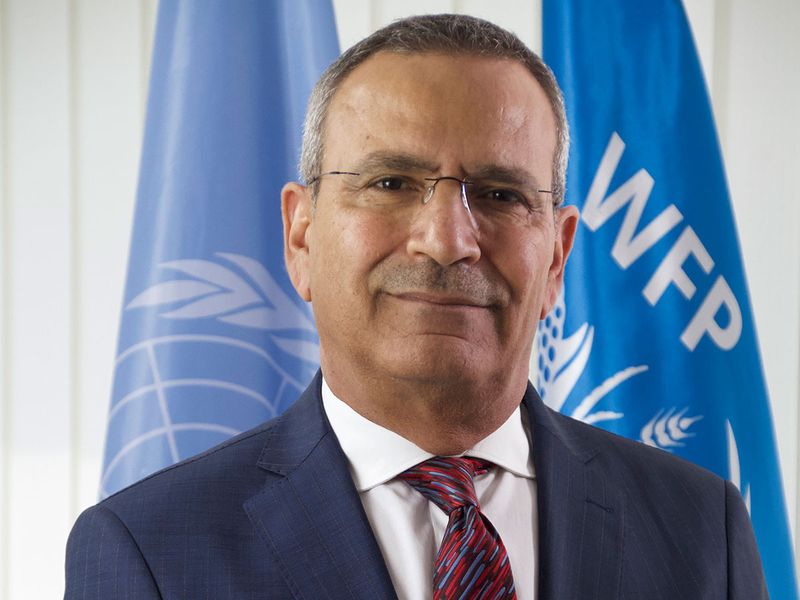
Dubai: The United Nations World Food Programme (WFP) has warned against an impending threat to global food security, even as the humanitarian organisation battles a severe funds crunch itself.
Speaking to Gulf News after the WFP on Tuesday released an analysis report on the grave situation, Mageed Yahia, WFP Representative to the GCC, said: “WFP is experiencing an unprecedented funding crisis, with a projected operational requirement of $25.1 billion for 2023 and forecasted funding standing at just $10 billion. This creates a staggering 60 per cent funding gap - the highest ever recorded in WFP’s 60-year history.”
He said the situation is the result of various factors, including new conflicts, the ongoing impact of COVID-19, economic downturns and the climate crisis. “The cost of inaction is catastrophic, as cuts to assistance risk pushing millions of people deeper into hunger and destabilising communities. Humanitarian agencies like WFP require adequate funding to provide assistance, and when funding falls short, it directly affects food security, causing hunger level to increase,” he noted.

According to the report, every one per cent cut in food assistance risks will push more than 400,000 people towards the brink of starvation.
WFP is being forced to drastically cut rations in most of its operations as international humanitarian funding plummets, the report said. Experts estimate that, as a result, an additional 24 million people could slip into emergency hunger over the next 12 months – a 50 per cent increase on the current level.
Yahia said, “The MENA region is highly affected by the funding shortfall as it’s a region that has been already suffering for years from the effects of climate, economic turmoil and ongoing conflicts.”
Giving a break up of the ground situation in the region, he said that in Syria, WFP cut assistance in July for 2.5 million of the 5.5 million people who rely on the agency for their basic food needs. “These 5.5 million were already on 50 per cent rations. Further reductions in ration size were impossible and so WFP was forced to prioritise 3 million Syrians as of July.
Similarly, in Palestine, he said WFP cut its caseload in the country by 60 per cent - or 200,000 people in June. In May, WFP had already cut the value of its cash assistance by around 20 per cent. “Without further funding, the operation will come to a complete halt in November,” he added.
In Jordan too, WFP has reduced the cash assistance given to all refugees (both in and outside camps) by a third, and is gradually excluding nearly 50,000 individuals living outside camps from receiving any assistance at all. “And in South Sudan, funding constraints mean WFP can only provide half rations and must prioritise life-saving assistance for those closest to famine. Two-thirds of the population (7.76 million people) are facing hunger (IPC3+), including 43,000 people facing catastrophic hunger, yet WFP is only able to provide assistance to 3.2 million people facing the highest levels of food insecurity due to funding shortfalls,” revealed Yahia.
The WFP report estimates a total of 345 million people facing acute food insecurity (IPC3+) worldwide, with 40 million of these in emergency levels of hunger (IPC4). These are people forced to take desperate measures to survive and are at risk of dying from malnutrition, the agency said, claiming that its food assistance is a vital lifeline, often the only thing separating them from starvation.
Experts at WFP fear that a humanitarian ‘doom loop’ is being triggered, where WFP is being forced to save only the starving, at the cost of the hungry. Yahia said, “Cutting food assistance is creating a downward spiral for hundreds of thousands of already hungry people and leading to more humanitarian emergencies in the future. This process risks reversing years of hard-won development gains. It is also worth noting that the situation is not limited to WFP. Across the board, the gulf between humanitarian needs and funding available to respond has grown steadily - swelled by new conflicts, economic downturns and the climate crisis. Our humanitarian dollar is being stretched to breaking point.”
WFP Executive Director Cindy McCain said, “With the number of people around the world facing starvation at record levels, we need to be scaling up life-saving assistance - not cutting it. If we don’t receive the support we need to avert further catastrophe, the world will undoubtedly see more conflict, more unrest, and more hunger. Either we fan the flames of global instability, or we work quickly to put out the fire.”
UAE support
Making special mention of the UAE’s support to WFP, Yahia said, “The UAE is often first to raise a helping hand in the most dire situations, as they did earlier this year when they provided emergency airlifts of key supplies to help the humanitarian response to Turkey’s devastating earthquake. WFP has a longstanding partnership with the UAE through UAE AID.”
He said, “In 2022, UAE contributed $94.4 million to WFP operations. Through 2022-2023, with the support of MBRGI, WFP has delivered more than 121 million meals to the most needy communities from Burkina Faso, to Palestine, Jordan, Syria and Bangladesh to name just some of the countries receiving life-changing help. There are million meals more yet to be delivered this year as a result of the support of this key strategic WFP partner.”
“We look forward to continuing to build our relationship with the UAE and expand into areas like specialist technology and knowledge exchange to serve the most vulnerable people around the world in the most effective and impactful ways possible,” he added.












